- Home
- Edward Lee
Creekers Page 2
Creekers Read online
Page 2
The kid popped out of one of the storage rooms and sprinted toward the dead EXIT sign, his feet scuffing frantically.
TSD had already chained that exit from the outside.
“Come on, kid. You can’t get out that way. Let’s you and me have a talk, all right? I won’t hassle you, I promise.”
It was sad, the way these dope-gangs indoctrinated kids into their business. Of course they grow up to be criminals—it was the only thing they knew. And how old was this one? Ten? Twelve? Christ, Phil thought drearily. The kid hit the door, found it locked, then turned around, wide-eyed in his terror.
This kid looked about seven or eight.
“Don’t worry, I won’t hurt you,” Phil assured. “But you’re gonna have to come out here now so we can get you squared away.”
The kid’s face looked like a dark skull in Phil’s Kel-Lite beam. Tears glistened on lean, dark cheeks. He’s shit-scared, all right, Phil realized. The worst part was the district court’d just stick them in an orphanage, and nine times out of ten they’d just run back to the streets at the first opportunity.
“You’re gonna have to come with me now,” Phil said.
He never saw what was coming—he never even saw the gun. At once, the ever-familiar sound of a small-caliber pistol clapped his ears
pap! pap! pap!
The moment was mayhem. Fierce tiny lights blinked in his eyes; Phil only had time to let instinct haul him behind an empty refuse drum. His Kel-Lite rolled across the cement floor when another bullet pinged into the drum. Phil drew his service revolver
“Goddamn it, kid! Are you nuts?”
Then he fireda shot high over the kid’s head.
The kid stopped shooting.
How could I have been so stupid? Too busy worrying about the goddamn Yankees. A second later, two S.O.D. men were aiming lights down the corridor. “Don’t shoot!” Phil hollered. “It’s just a kid!”
Now more cops were trotting into the hall. “You all right, Lieutenant?” Eliot was asking, and helping him up.
“I’m fine,” Phil replied. “But I’m not sure I can say the same for my shorts.”
“What happened?”
“Just some shit-scared kid. I popped a cap over his head.”
But Eliot was giving him a funky look, and then Phil thought he heard some guys down the hall calling for an EMT.
No, no, Phil thought, and sprinted down the hall himself. “I swear to God I fired over his head!”
More cops spilled into the hall, flashlights bobbing…
“Fired over his head, huh?” Dignazio was striding loudly behind. He glared at Phil. “That’s a real piece of work right there, Straker. The deputy comm’s gonna love this.”
The words groaned in Phil’s mind like an old house in the wind: Good God Almighty…
The kid lay at the foot of the chained exit doors, blood pumping from the bullet hole in his upper-right chest. He was dead before they could even get him on the stretcher . . .
««—»»
Phil peered into the memory. Six months ago I was a metropolitan police lieutenant about to make captain, and now I’m a nightwatchman making $7.50 an hour. The death of the kid had been ruled a justifiable homicide by Internal Affairs, even though Phil swore up and down that he’d fired well over the kid’s head. “Not high enough,” the chief investigator had told him. But that wasn’t why he’d resigned…
Dignazio, he thought.
It had to have been Dignazio.
The IAD chief investigator was an anal-retentive stoneface named Noyle. “Lieutenant, what kind of ammunition were you using in your service revolver on the night in question?” he asked.
“Thirty-eight plus P plus,” Phil answered, taken slightly aback at the undue inquiry.
“Thirty-eight plus P plus. Hmm. And what type of service ammunition does the department authorize for sidearm use?”
“Nine millimeter hardball, and thirty-eight—”
“Thirty-eight plus P plus?”
“Yes.”
“And does the department authorize the use of any other type of service sidearm ammunition, Lieutenant?”
What the hell is he driving at? Phil pondered. Why this roundhouse of irrelevant questions? “Only for S.O.D. personnel,” he replied, “but only when specifically authorized by Special Operations Division Deputy Commissioner.”
“And are you an S.O.D. officer, Lieutenant?
“No,” Phil said. “I’m in Narcotics.”
“And on the night in question were you for any reason authorized by the Special Operations Division Deputy Commissioner to use ammunition in your service revolver other than thirty-eight plus P plus?”
Phil was hard-pressed not to frown. “No.”
Noyle leaned back in his chair, centered at the long conference table like a low-rent Caesar, with Cassius and Brutus to his left and right. His steely eyes never blinked. “Lieutenant, do you know what a quad is?”
Why’s he asking me about quads! This was getting aggravating. “Yes,” he answered, perhaps a little testily. “A quad is a special kind of bullet.”
“And why is it ‘special’?”
“Because it fires four cylindrical slugs instead of a solid, one-piece projectile.”
“And what is the purpose of this?” Noyle asked.
“Increased stopping-power. On impact the slugs separate in the target and disperse. Quads, in other words, do a lot more damage than standard one-piece projectiles.”
“A ‘dum-dum’ bullet, so to speak.”
“Yes,” Phil answered. “A factory-made dum-dum, I guess you could call it… But, sir, if you don’t mind, what’s the purpose of these questions? If you want to know about tactical ammunition, you’d be better off talking to the rangemaster or the S.O.D. armorer.”
Noyle outright ignored Phil’s query. “Lieutenant, do you know of any occasion when quads have been or would be authorized for use in this department?”
“No,” Phil said.
“No, Lieutenant?”
A pause followed, then Noyle was whispering with his IAD counterparts. Phil took the opportunity to probe their faces. They all looked the same: similar suits, similar blank expressions. They looked like inquisitors, and Phil felt like a warlock on trial for heresy. What in God’s name is going on here?
Noyle’s rodent eyes returned to Phil’s face. “Lieutenant, you’ve just admitted to myself and the other hearing officers that quads are unauthorized for use in this department.”
“Right,” Phil said. He was starting to feel itchy, hot.
“Then why were you using them?” Noyle asked.
The question fell on him, like a wall collapsing. His temper had begun to simmer. He wrung his hands in his lap.
“I was not using quads,” he affirmed very slowly. If he didn’t speak slowly, he’d get mad, and one thing he didn’t want to do was pitch a fit in front of three IAD investigators. These three poker-faces were the department’s ball-cutting crew. Instead, Phil took a breath, exhaled, and repeated, “I was not using quads. I’ve never loaded quads on duty or off. And if you want to know the truth, I’m getting really confused right now. I can’t make any sense out of this line of questioning.”
“Nor can we,” Noyle inserted, “make any sense out of your testimony today, Lieutenant Straker. It seems to us that you’re lying.”
Phil leaned forward across the conference table. “Pardon me?”
“Lieutenant, isn’t it proper protocol for an officer to be placed on administrative leave after a shooting?”
“Yeah,” Phil answered, “just as I was placed on administrative leave after this shooting.”
“And what else did you do? Isn’t it also protocol for an officer to turn in his or her service weapon upon such an instance?”
“Yeah, to the next ranking officer on the site. I did this, too. Immediately. And if you think I was using quads on the night of the shooting, just check my service revolver. It’s locked up in the property room. O
pen it and look in it, check the ammo.”
Noyle cleared his throat—for formality, not because he needed to. “We did exactly that, Lieutenant, and we found one expended cartridge in the number one chamber. Chambers two through six were loaded with 38-caliber quads.”
“That’s bullshit!” Phil stood up and yelled.
“No, Lieutenant, it’s evidence,” Noyle informed him. “And so is the autopsy report filed by the district medical examiner.”
“What the hell are you talking about?” Phil asked as though each word were a stone being expelled from his throat.
“That boy you shot?” Noyle paused a moment to adjust his tie. “According to the autopsy report, he was shot in the high chest area, just above the right lung. Upon impact, the projectile dispersed as, and I’ll quote, ‘four point-three-eight inch fragments, two of which exited the body from a high-right anterior position. A third fragment tumbled down the dorsal-side of the spinal column and lodged in the left calyx cavity of the left kidney. The fourth fragment penetrated the aorta.” Noyle cleared his throat again, then looked back at Phil. “The Special Operations armorer positively identified the referred-to fragments as ‘dispersed missile debris’ from an unauthorized bullet known as a quad, Lieutenant. Records and Ident verified that the weapon which fired this bullet was your own. And the district medical examiner concluded that the victim’s death can be directly attributed to the particular ammunition that was used. In other words, Lieutenant if you’d been using standard, department-authorized ammunition on the night in question, that eight-year-old boy would still be alive…”
Still be alive. Noyle’s final words reverberated in Phil’s head now, months after the fact. At first he’d tried to fight IAD’s findings, but it didn’t wash; Phil knew he’d somehow been framed by Dignazio, but how could he prove it? A week later, Phil was standing before the commissioner himself, and was told, “You’ve got two choices, Straker. You can stick with this ridiculous story about being framed, in which case the district attorney’s office will charge you with negligence, premeditated use of dangerous and unauthorized ammunition, and at the very least, second-degree manslaughter.”
“What’s my other choice?” Phil grimly inquired.
“You can resign. The incident, of course, will go on your department record, but no charges will be brought against you. Use your head, son. Turn in your papers.”
Which Phil did. The comm was right—there was no other choice for him. If he challenged the accusations, he’d be formally charged and prosecuted. And since he had no solid proof that Dignazio had framed him, he’d be found guilty. He’d get sentenced to a year at least, and if there was one thing he knew, cops rarely lasted a month in the joint.
So here I am, he thought now, standing in the middle of a textile factory at two in the morning. Blackballed. Washed up. No police department in the country would touch him, not with the bullshit in his metro personnel file. At age thirty-five, his blazing career in law enforcement was over, his degree useless, and over a decade of hard work had been reduced to nothing more than a small pile of ashes.
He almost laughed. All right, so my cop career is over. Now I’ve got a new career as a security guard working midnight-to-eights and pulling in $7.50 an hour It’s better than being in the joint…
The job itself required very little in the brain department; a well trained chimp could do it, he supposed. Security work was about the only thing he could think of that was relative to his education and interests, and Preventive Security, Inc. was the only company in the state which offered him a job despite his rep with the metro cops. The job was simple: he punched a Latham roundclock every hour in the factory. The rest of the time he sat in an office, drank diet Pepsi, and read novels. “It’s a cinch,” his new boss promised. “We haven’t had a break-in at this place in twenty years.”
Interesting work.
Then the perimeter alarm went off.
“So much for the boss’s twenty-year record,” Phil mumbled to himself. Probably an alarm malfunction. He checked the jack plate on the Sparrow/Jefferies alarm system. ZONE TWO, the light blinked. ENTRY BREACH.
I don’t believe it! I’ve got someone busting into the place! He cut the office lights and screwed the red lens on his Kel-Lite. Then he grabbed his GOEC Mace—Preventive Security was an unarmed company, no gun permits—and slipped out into a secondary transport aisle. He kept his light low; he didn’t want to scare anyone away, he wanted to catch them, if only to relieve the boredom. Walking through the dark factory, though, put him on edge. What if the intruders were armed? Just be careful, skillethead. Flanks of nameless machines led him around the production area. At the other end of the building (designated ZONE TWO) he could see the exit door ajar.
Someone’s in here, all right, he realized. But who would want to break into a freakin’ textile factory? What’s to steal? Spools of thread?
Down the aisle and another turn, and his question was answered. How stupid can crooks be? he wondered. Someone had turned on the lights in the automat, and right this instant he could see a shadow leaning over one of the machines. A coinbox jockey, it seemed obvious to him. Why work a job when you can make a living busting into vending machines? On Metro, this would’ve been an easy collar, but Phil’s new boss reflected some very serious sentiments for situations that actually involved a burglar. “Remember, Phil, you’re not John Law anymore, you’re just a guard. You see anyone actually break into that place, you call the county cops and get out. No playing hero. Christ, in this state if a guard injures a crook during a crime, the crook sues and wins. I don’t need any lawsuits or liabilities.” Phil saw the man’s point, especially given the fact that he didn’t have a gun or police powers any longer. But—that didn’t mean he couldn’t have a little fun…
“Freeze! Police!” Phil shouted. “Don’t move or I shoot!”
“With what? A paper clip and rubber band?” the “intruder” replied and casually turned away from the vending machine. Then he smiled. “How’s it goin’, Phil? It’s been a long time since I’ve seen Crick City’s favorite son. I guess you’re not too keen on keeping in touch.”
Phil couldn’t believe it. The man who faced him stood short and fat. The bald pate glimmered in the automat’s buzzing fluorescent light, and his mustache was like a stout caterpillar on his lip. Those features, plus the tidy, starched municipal police uniform, were all Phil needed to recognize.
“Lawrence Mullins,” Phil identified, “Chief of the Crick City Police Department. Would you mind telling me what in the hell you’re doing here?”
“What’s it look like? I’m getting a cup of coffee,” Mullins said and raised the steaming Macke cup.
Phil closed his eyes and took a deep breath. Calm down, he commanded himself. Don’t blow up.
Then, as was usually the case, he…blew up.
“You broke into my factory just to buy a goddamn cup of coffee!”
Mullins chuckled approvingly. “Still got that temper, I see. Good, good. And, you know, you sure got some cheapie locks on this place. Shit, I had that door open in less time than it takes to use the key. Oh, and how about reholstering that 44-magnum can of Mace, huh? What, you get a lot of mean dogs around here?”
Phil sighed. “Please, Chief. Don’t screw with me. I’ve had a bad day—or I should say, a bad year.”
“So I’ve heard. Back in town, we all heard about that shooting when you were with Metro. But we can talk about that later. That was a smart move, resigning voluntarily instead of fighting them. You fight with any big city IAD, you lose your ass. Then you really would have been washed up. Shit, a former cop with convictions… You wouldn’t have been able to get a job cleaning the greasehole at Chuck’s Diner.”
One thing Phil didn’t need to be reminded of was the Metro frame. And another thing he didn’t need was a load of wisecracks. “Chief, look, it’s good to see you and all that, but are you going to tell me why you’re here, or are you just trying to piss me off while you
stand there sipping coffee?”
Mullins sipped more coffee, just barely smiling over the steam. “Oh, is that what you want to know? You want to know why I’m here?”
“Yeah, Chief, I do.”
“Well, we’re friends, right? From way on back? Shit, I practically raised you myself. And when I heard about the Metro thing, and you taking this pissant security job, well… I was a little concerned, that’s all. I mean, it’s not like you’ve seen fit to stop by your old hometown once in a while, you know, just to say hello to some of the folks you grew up with. But of course I guess you been too busy for the last ten years, what with the highfalutin’ big city job with Metro. A narc lieutenant, ain’t that what you were?”
Were, Phil slowly thought. Not am. Not anymore. “Chief, are you trying to make me feel guilty? All right, so I haven’t kept in touch. Sorry. But you still haven’t told me why you busted into my gig.”
Mullins laughed. “Well, I wanted to see if you were keeping on your toes, now that you’re not a cop anymore.” The chubby man grinned at the open service door. “Pretty slick lock-picking, huh?”
“Chief!”
Mullins was getting a real kick out of this. “Okay, Phil, I’ll level with you. The real reason I came all the way out to this bumfuck yarn factory is because, well… I want to talk to you.”
Mullins’ cat-and-mouse games got old fast; this was the first Phil had seen of him in nearly a decade, and he was already sick of him. Some guys never change, he dully realized. “Fine, you want to talk to me. About what? Please, Chief, tell me before I have a stroke.”
Mullins finished his coffee and pitched the cup in the trash. Then he got a Milky Way out of the next machine.
Then he said, “I want to offer you a job on my department.”
And that was about all Mullins had elaborated upon, which was pretty typical; Mullins’ hedging sense of humor was part of his overall psychology—he’d always make his point by taking subtle shots. Phil had been born and raised in Crick City. His father had run off a week after he’d been born, and his mother died about a year later when the laundromat she’d been working in caught fire. So Phil was reared by an aunt, who received a subsidy from the state, and about the only thing he ever had that came close to a father-figure was Mullins, the chief of Crick City’s police department for as long as anyone could remember. Mullins, now, had to be close to sixty, but to Phil he’d always looked the same, even back when Phil was in junior high and hanging out at the station after school.

 In the Year of Our Lord 2202
In the Year of Our Lord 2202 The Minotauress
The Minotauress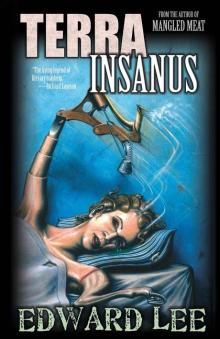 Terra Insanus
Terra Insanus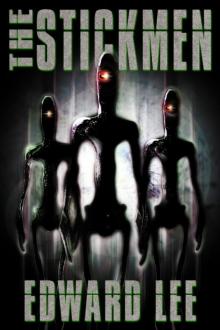 The Stickmen
The Stickmen Flesh Gothic by Edward Lee
Flesh Gothic by Edward Lee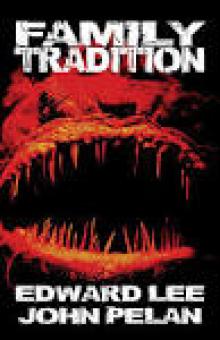 Family Tradition
Family Tradition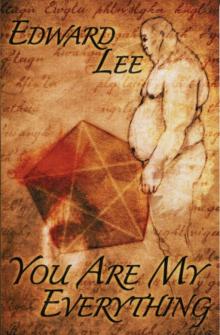 You Are My Everything
You Are My Everything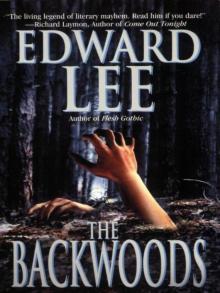 The Backwoods
The Backwoods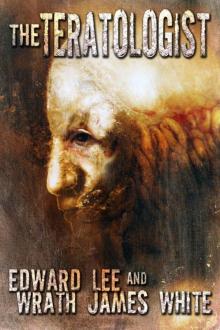 The Teratologist
The Teratologist Smoke and Pickles
Smoke and Pickles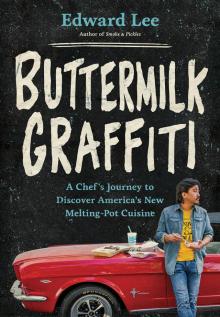 Buttermilk Graffiti
Buttermilk Graffiti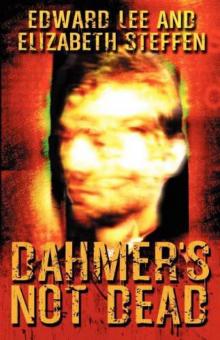 Dahmer's Not Dead
Dahmer's Not Dead Quest for Sex, Truth & Reality
Quest for Sex, Truth & Reality The Innswich Horror
The Innswich Horror Brides Of The Impaler
Brides Of The Impaler Goon
Goon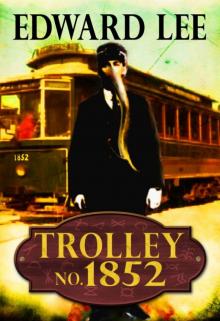 Trolley No. 1852
Trolley No. 1852 Sacrifice
Sacrifice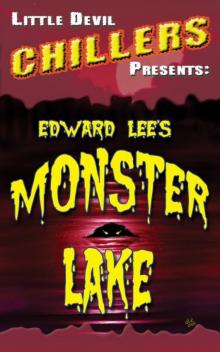 Monster Lake
Monster Lake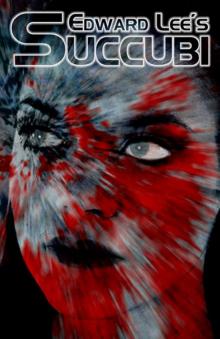 Succubi
Succubi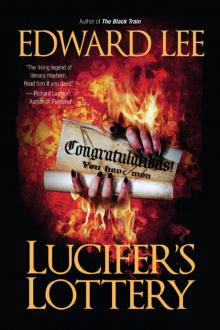 Lucifer's Lottery
Lucifer's Lottery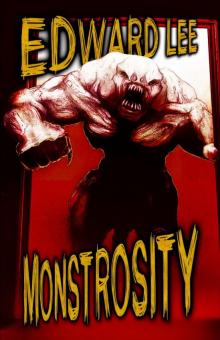 Monstrosity
Monstrosity The House
The House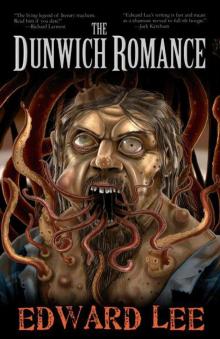 The Dunwich Romance
The Dunwich Romance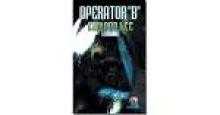 Operator B
Operator B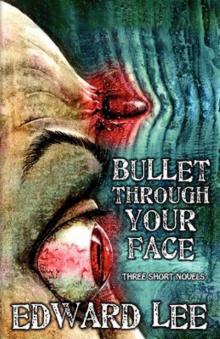 Bullet Through Your Face (improved format)
Bullet Through Your Face (improved format) Grimoire Diabolique
Grimoire Diabolique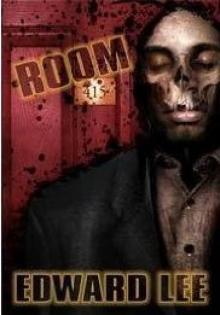 Room 415
Room 415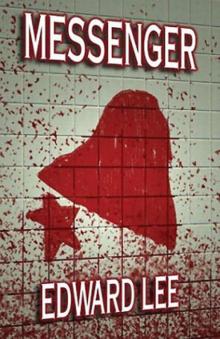 The Messenger (2011 reformat)
The Messenger (2011 reformat)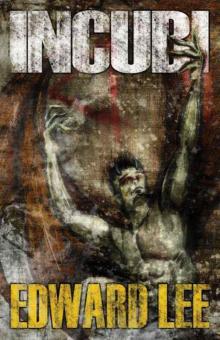 Incubi
Incubi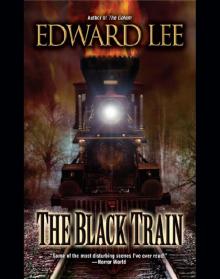 The Black Train
The Black Train House Infernal by Edward Lee
House Infernal by Edward Lee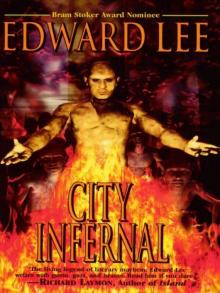 City Infernal
City Infernal Creekers
Creekers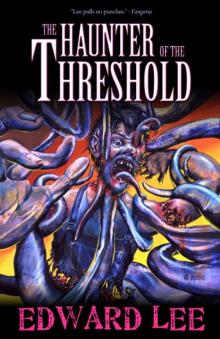 The Haunter Of The Threshold
The Haunter Of The Threshold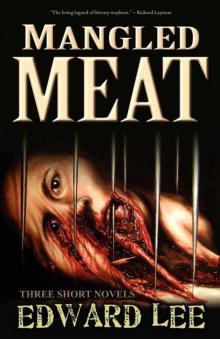 Mangled Meat
Mangled Meat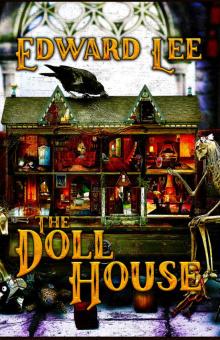 The Doll House
The Doll House Header 2
Header 2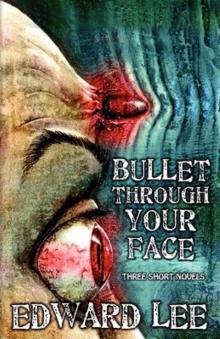 Bullet Through Your Face (reformatted)
Bullet Through Your Face (reformatted)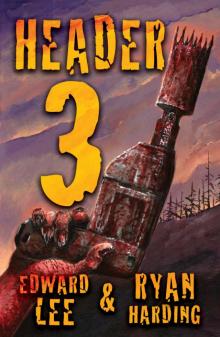 Header 3
Header 3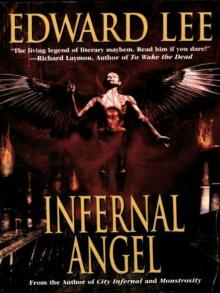 Infernal Angel
Infernal Angel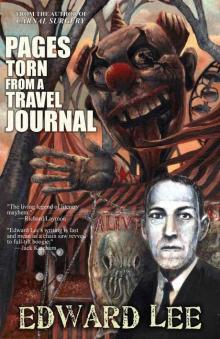 Pages Torn From a Travel Journal
Pages Torn From a Travel Journal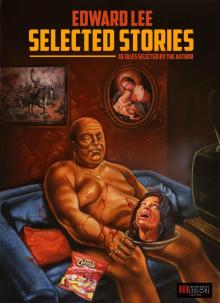 Edward Lee: Selected Stories
Edward Lee: Selected Stories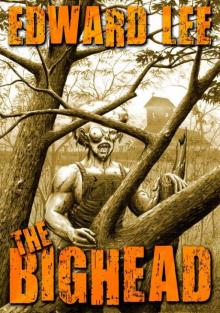 The Bighead
The Bighead The Chosen
The Chosen